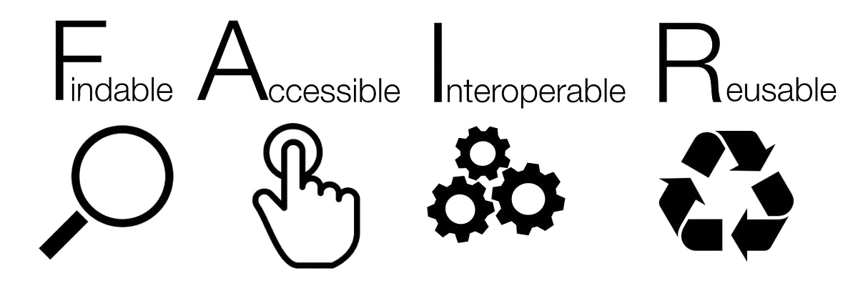Data stewardship is the management and governance of data assets in an organization to check the accuracy, reliability, accessibility, and compliance with legal and ethical standards. Data steward (DS) is a person who facilitates between data and users/partners. DS must make the data FAIR (Findable, Accessible, Interoperable, and Reusable) and compliant with regulations such as GDPR (General Data Protection Regulation).
Why is data stewardship important?
- Access: DS creates and maintains organization’s cloud infrastructure, giving access to users and responsible of the security of all the data within the cloud.
- Efficiency: organizes data for efficient retrieval and analysis.
- Compliance: comply with legal and ethical guidelines, such as GDPR.
- Collaboration: data sharing within the organization or outside of organization while maintaining security.
FAIR

| Findable Data must be easy to find. This is achieved by assigning a persistent identifier, such as DOI, ORCID, or URL and creating the metadata (descriptive information about the data). Both data and metadata must be stored in a searchable repository. Accessible Metadata and data should be retrievable using open protocols. Data should be accessible to users who have the right to view it. This does not mean all data is public, access controls can still be applied. Interoperable Data should use standardized formats and vocabularies for integration across different systems. It aims for the data to be combined and used across various platforms, it should be formatted using international standards and common ontologies (controlled vocabularies that define terms). This prevents issues where different systems store data in incompatible ways. Reusable Data should be well-documented, with clear licensing and provenance. For data to be reusable, it must include comprehensive metadata, describe how it was collected, and specify usage rights. This allows partners or collaborators to confidently use the data. |
GDPR
The General Data Protection Regulation (GDPR) is a European Union regulation designed to protect personal data. DS must do:
- Data minimization: Only necessary data is collected and processed.
- Transparency: Users must be informed about data collection and usage.
- Security: Proper measures on cybersecurity to protect data from breaches.
- Right to access and erasure: Individuals can request their data and have it deleted if needed.
Responsibilities of a DS
- Data Management: creating Data Management Plan (DMP) and implementing data system and pipelines.
- Metadata Creation and Management: creating accurate descriptions of data and attaching it to the files, making the files easy to find.
- Data Governance: enforcing policies on data access, security, and retention.
- Data Integrity and Quality Control: monitoring data accuracy and resolving inconsistencies.
- Compliance Monitoring: ensuring data aligns with FAIR principles and GDPR regulations.
- Training and Support: making documentations, tutorials and ready to be called anytime in case of data-related issues.
Are you interested in managing data?
Here are some resources to help you manage your data better!
1. Data Management
- Introduction: https://www.coursera.org/learn/introduction-to-data-management
- Research Data Management and Sharing https://www.coursera.org/learn/data-management
2. FAIR and Open Science
- FAIR Principles: https://www.go-fair.org/
- Open Science : https://www.unesco.org/en/open-science
- Open Science Framework (OSF): https://osf.io/
3. Get Familiar with GDPR and Data Protection
- Official GDPR Website: https://gdpr-info.eu/
- GDPR Compliance Guide: https://ico.org.uk/media/for-organisations/guide-to-the-general-data-protection-regulation-gdpr-1-0.pdf
Leave a Reply